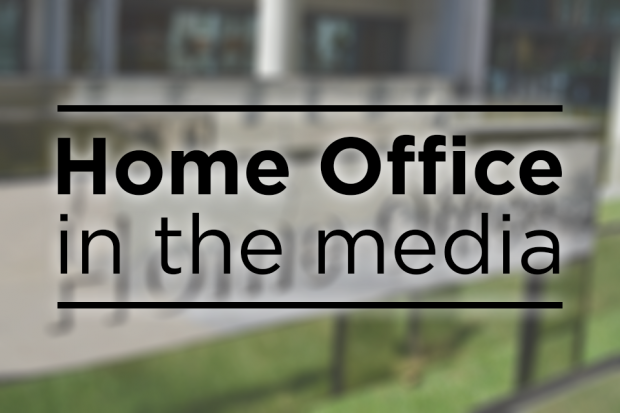
A number of newspapers cover the Public Accounts Committee report on modern slavery today including the Times, Independent and Mirror. The report acknowledged that the UK is ahead of many countries when responding to modern slavery but makes a number of recommendations for further progress.
A Home Office spokesperson said:
Modern slavery is a barbaric crime that destroys the lives of its victims, which is why we introduced the world-leading Modern Slavery Act in 2015 and have put in place the Modern Slavery Strategy.
The Public Accounts Committee recognises that the UK is ahead of many countries in responding to modern slavery and the Government’s Modern Slavery Taskforce will consider its recommendations carefully.
We have recently announced reforms to the National Referral Mechanism to make sure it supports more victims at a quicker pace and we are taking action to eradicate modern slavery from the economy, including requiring large businesses to report on how they are tackling and preventing this crime in their supply chains.
Factsheet on modern slavery
Modern Slavery Strategy
- The UK is the first country in the world to have dedicated legislation in place to tackle modern slavery. The Government has had an ambitious Modern Slavery Strategy in place since 2014.
- In 2016 the Prime Minister announced a new Modern Slavery Taskforce, which sits at the centre of Government, to drive further progress in tackling slavery and people trafficking.
- To co-ordinate the modern slavery response across Government and ensure accountability for delivering the Modern Slavery Strategy, the Cabinet Office has appointed a Senior Responsible Officer.
- In October 2017, we published new research that has identified 17 distinct types of modern slavery in the UK. The findings will be used to inform our response to preventing modern slavery from taking place.
Action against modern slavery offenders
- There are more than 600 live modern slavery police operations underway.
- More potential victims are being identified and protected due to a greater awareness and improved understanding of modern slavery. In 2017, 5,145 potential victims of modern slavery were referred to the UK’s National Referral Mechanism, a 35% increase on 2016.
- The latest conviction figures from 2016 show that 55 offenders were convicted of modern slavery offences, a 77% increase from 2015.
Preventing modern slavery in supply chains
- We have world-leading measures such as the requirement for businesses with over £36m turnover to comply with Transparency in Supply Chains legislation (TISC)
- In October 2017 we launched an awareness raising campaign targeting over 10,000 businesses, reminding them of their obligations and providing them with guidance on how to take action to address modern slavery.
- We have seen thousands of statements published by businesses, and many examples of good practice are emerging.
- We have also launched a new initiative called the Business Against Slavery Forum. This forum is a new partnership between Government and business to accelerate progress in tackling modern slavery. It will focus on sharing best practice, building new initiatives to tackle modern slavery in global supply chains, and to help support smaller businesses take action.
National Referral Mechanism (NRM)
- We have recently announced reforms to the National Referral Mechanism which will make substantial improvements to a system which is supporting more victims than every before. Decisions will be made in a more efficient and streamlined way, and additional independent scrutiny will ensure quality decision-making.
- These reforms will also ensure the NRM helps support victims to leave situations of exploitation and enables them to begin to recover and rebuild their lives. The Government is introducing minimum standards of care for victims, and a longer period of support when victims leave the NRM, so they can build lives free from exploitation and vulnerability.
- We consulted extensively with key partners on the reforms to the NRM – including charities, police, law enforcement and the Independent Anti-Slavery Commissioner.
Government funding to tackle modern slavery in the UK and overseas
- In total, £150m of aid funding has been committed by the Government to tackle modern slavery across the globe, enabling more work in collaboration with source and transit countries. This includes £33.5m up to 2021 managed by the Home Office, which will primarily focus on high risk countries from where we know victims are regularly trafficked to the UK. For example, we are investing £3m in Vietnam, £5m in Nigeria and also have a dedicated Innovation Fund to support new approaches to tackling modern slavery.
- Our commitment to stopping modern slavery was brought to the fore at the Commonwealth Heads of Government Meeting last month. At a security event hosted by the Home Office, this Government announced a further £5.5m for projects aimed at strengthening the Commonwealth’s response to slavery and child exploitation. These projects, delivered in countries across the Commonwealth, will work to support the development of modern slavery legislation in parliaments; strengthen law enforcement capabilities to disrupt criminal networks; and identify those most at risk of becoming victims to better protect them.
